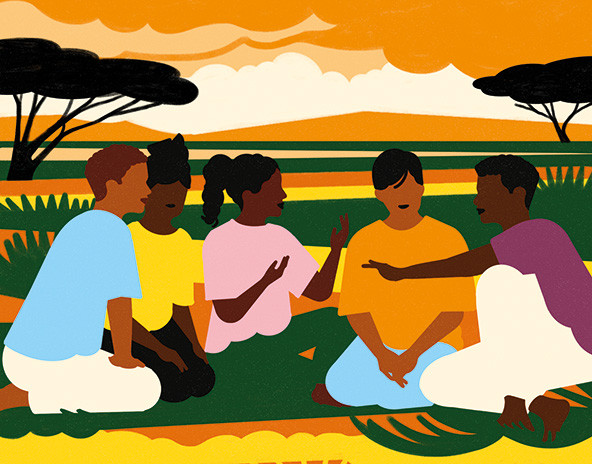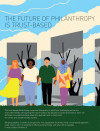 (Illustration by Andrea Mongia)
(Illustration by Andrea Mongia)
I was born in apartheid South Africa, where racism and injustice defined society. The country’s white minority used its power to build systems and structures to divide and oppress people. Inequity was all around us. While this history still looms over the country, South Africa is not alone. Historical inequities have shaped every society, every sector, our contemporary lives, and our organizations. Philanthropy is no exception. I founded the Charlize Theron Africa Outreach Project (CTAOP) because of the lasting impact of inequity on young people and their communities. The longer we do this, the more we realize that conventional philanthropy, like many other sectors, keeps power where it is. — Charlize Theron
The Future of Philanthropy Is Trust-Based

The trust-based philanthropy movement has grown in rapid time, but there are still basic misunderstandings about this approach and its bold vision for a more just and democratic society. This supplement illustrates what a trust-based approach really means, why it is essential to effective philanthropy, and what will be possible if more funders embrace it. Sponsored by the Trust-Based Philanthropy Project
As funders, if we are to achieve our shared vision with our grantee partners, we need to build an environment with strong relationships, where each of us takes responsibility for our role. Too often this isn’t the case. Our mission at CTAOP is to invest in and advance the health of young people in southern Africa to create a more equitable future for all. We achieve this by forming close bonds with our program partners, which requires both trust and accountability. It is our belief that through these relationships we can best support community leaders to create positive change in the lives of young people.
By defining accountability as taking responsibility for our actions, we can think critically about the role we play in a larger ecosystem of change. While we understand that each funder operates in unique contexts and with limitations that shape their approach, our hope is that this article encourages them to think more with an equity lens, especially as it pertains to their own accountability.
From Control to Accountability
In philanthropy, accountability is a practice generally required solely of the grantee, and grant makers often pass on any accountability requirements to their community partners. Many funders require burdensome proof of numbers reached and completed activities, quarterly impact, or detailed financial audits. Such data are often more about compliance with funders’ requirements than learning about community impact. Funding and strategy decisions not based on learning may subsequently be based on biases shaped by non-local norms. Individuals with relevant lived experiences are often labeled solely “beneficiaries” or “recipients,” while others who possess greater positional power are deemed “experts” or “authorities” best suited to solve societal challenges.
Some indicators can be helpful for learning about our partners’ work. But if we are honest with ourselves, philanthropy’s conventional accountability practices often more closely resemble a comprehensive audit. Very rarely does a funder’s measurement of impact include any reflection on or evaluation of their own role in achieving the shared goal. Rather the focus is on judgment of the community partners’ work. Beyond receiving occasional feedback, few funders truly build mutual accountability—what we define as an agreed-upon process for both funders and grantee partners to be held responsible—into their work.
Nonprofits are conditioned to view accountability through a similarly tinted compliance lens. They must play by the rules of the philanthropic game, conforming to funder requirements frequently at the expense of their work and the communities they serve to receive funding. “Given the limited amount of funding available, grantees like [us] often have no choice but to accept funding from donors,” one CTAOP program partner explains, “even when our experience, values, and passion are not recognized or acknowledged.”
CTAOP has always prioritized care and responsiveness, an approach that is mirrored in how we honor the expertise and experiences of youth and our program partners.
The likelihood that trust erodes between organizations and the communities they serve increases when funders make unilateral decisions about data collection, impose perspectives that only represent the Global North, or demand that organizations carry out what funders deem “evidence-based” programming because funder requirements may force organizations to push aside local needs or compromise cultural norms. Community-based organizations cannot carry out meaningful work when communities lose trust in the organizations that serve them.
As funders, we must sharpen our analysis of accountability and power within our organizations when we assess impact instead of only focusing on unhelpful metrics imposed upon grantees.
An Allyship Approach
Like many funders, we rely on the leadership of local changemakers to advance our mission as a grant maker. Our program partners know the nuances of societal inequities they experience. They see how seemingly disparate issues are interconnected, which levers to pull to make change, and how to navigate the local network.
This ethos has been integral to our work from the beginning. When Charlize Theron founded the organization, she was driven by the power and passion of young people in South Africa and a desire to provide the respect and space that society rarely affords them. Mobilizing resources was an important piece of CTAOP’s role, but we knew that how resources are deployed was just as important. While we raise money and provide multiyear, flexible, long-term funding and capacity-strengthening support, we work together with youth leaders and community organizations to ensure that we are centering the young people and communities.
CTAOP has always prioritized care and responsiveness, an approach that is mirrored in how we honor the expertise and experiences of youth and our program partners. We build relationships rooted in allyship and self-accountability by sharing our commitment to them at the beginning of our relationship and then holding ourselves accountable by soliciting anonymous feedback about our support for our program partners. Relationships are less transactional and more personal—aside from one annual check-in, program partners reach out as little or as much as they’d like. All current partners connect more often than the check-in to share what is meaningful to them. While we can’t always meet everyone’s needs, learning helps us proactively and reactively deploy whatever resources we have in support of our shared goals. Our annual summit emerged from this allyship approach, and it has become the most valuable support CTAOP provides outside of core grants. We host multiple staff from all program partners in a space dedicated to their health and well-being, where they can strengthen skills and connect with one another, and unleash their collective strength and creativity and return to work rejuvenated.
Reimagining accountability requires self-examination, humility, curiosity, and a willingness to change. Part of our journey has included confronting the power imbalances inherent in traditional philanthropy—especially in grantmaking from the Global North to the Global South. Rather than being recognized for their leadership, expertise, and wisdom, communities working for local change are often portrayed as victims or in need of aid. Within this context, grant makers working across geographies have a responsibility to work toward decolonization. Several organizations are reimagining traditional organizational structures, such as OneVillage Partners, which has shifted from offering community-led programs to becoming a community-led organization, with plans to move from the current leadership structure to one where Sierra Leoneans define and lead the organization’s strategy, operations, and programming. In the spaces we hold—from our one-to-one relationships to advocacy efforts to the design of our summits—CTAOP sees our role as facilitators and true partners in learning and action. We are there to help raise and move resources to where our partners determine it is needed.
Reflect and Act
Acting as a trust-based, accountable funder means recognizing that we will occasionally misstep—we may even inadvertently cause harm. Although our program partners inform our processes and have largely shaped CTAOP’s theory of change, we sometimes unintentionally revert to conventional practices that reinforce control and compliance.
It is time to replace the old story about accountability—one that places the burden on the community partner—with new norms and practices rooted in trust and mutuality.
For example, we modeled our initial reporting process on typical funder questions and length. In our quest to be comprehensive and inclusive of the various programs, we required reporting numbers on 10 types of activities, numbers of participants in each activity (both new and recurring), numbers of youth receiving specific services, and descriptions of each activity and population. We also asked open-ended questions about successes and challenges and asked why they were successful and what plans there were to overcome challenges. These semiannual reports were burdensome to our partners and took valuable time away from their work. We spent hours collecting “overdue” reports and even more reviewing them and asking follow-up questions, to which they had to respond in writing. The process consumed everyone’s energy, delayed grant renewals, and reinforced the harmful funder-nonprofit dynamics we sought to avoid.
Our shortcomings did not go unnoticed. But admitting our failures and showing vulnerability opened the door to candid feedback from partners, including, “Yeah, your reporting sucks.” True accountability meant that we had to be open to honest feedback and make adjustments collaboratively. The result was a less burdensome and more meaningful system to share the learnings that inform our work.
Our plans for the future include working with our partners to establish shared goals informed by their expertise and experience. This road map, created together, will allow us to reinforce our commitment to accountability. It will also clarify how we might adjust or shift strategies to better help our partners achieve our collective vision. Whether we are facing a challenge, testing our assumptions, or seeking to learn more, we have found that engaging our program partners as teammates and thought partners not only aligns with our values, but also produces a better result in service of the mission.
The Responsibility to Build Something Better
Our partners on the front lines of change have been unfairly burdened by philanthropy’s draconian approach to accountability. It is time to replace the old story about accountability—one that places the burden on the community partner—with new norms and practices rooted in trust and mutuality. In the words of one of our earliest program partners, with trust came “outcomes we didn’t imagine possible. A major lesson for organizations like ours is that we also have to transform ourselves if we are to embrace all the magic that can be conjured when two entities collaborate on the basis of trust.”
In the Eastern Cape of South Africa, we have seen a program partner’s mental-health screening idea result in widespread adoption by the provincial government. We have witnessed complex and vital health information about anti-retroviral medication (ARVs) communicated to rural Xhosa communities rooted in oral culture through local song and dance. And we have supported the transformation of more than 40 shipping containers into solar internet cafés across Gauteng and KwaZulu-Natal provinces, providing safe spaces for young women and girls to access sexual and reproductive health information and programs tailored to meet their needs. These examples emerged from program partners taking the lead and CTAOP listening and responding with support.
Now more than ever, we need the leadership, vision, and brilliance of our nonprofit partners. A more equitable, just approach to accountability is fundamental to supporting them. When funders relinquish control and take responsibility for how we show up, we can cultivate relationships that unleash bold solutions.
Support SSIR’s coverage of cross-sector solutions to global challenges.
Help us further the reach of innovative ideas. Donate today.
Read more stories by Lorrie Fair Allen, Ashlee George & Charlize Theron.

